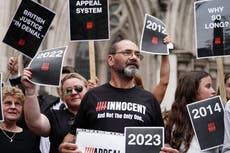Officials refused to examine DNA in wrongful conviction rape case ‘because of cost’
‘Further work would be extremely costly,’ Criminal Cases Review Commission warned as it rejected Andrew Malkinson appeals
A body set up to investigate miscarriages of justice failed to pursue DNA evidence in the case of a man wrongly jailed for rape because of the cost, internal logs reveal.
The Criminal Cases Review Commission (CCRC) twice turned down applications by Andrew Malkinson for his case to be re-examined before the Court of Appeal eventually overturned his conviction.
Commission files reveal that when discussing his application for it to conduct DNA testing – which subsequently cleared his name – officials noted “the cost cannot be ignored” and “further work would be extremely costly”.
Police and prosecutors knew four years after the conviction that another man’s DNA was on the clothes of the woman Andrew Malkinson was wrongly jailed for raping, yet he stayed behind bars for 13 more years.
Mr Malkinson, 57, was released from prison in December 2020 after 17 years. Last month his conviction was quashed when the DNA evidence was produced.
The commission had refused to order further forensic testing or refer the case for appeal in 2012.
In 2015, its chairman Richard Foster told MPs a lack of finance was the biggest inhibitor of the commission’s workload.
And Labour had previously warned of funding cuts to the commission, saying growing caseloads and falling budgets are having a severe impact on its work.
In an article for The Independent, Nazir Afzal, former chief crown prosecutor for northwest England, writes: “The impact of budget cuts had an explicitly negative impact on the decision making of the CCRC on the two previous occasions when they considered his applications and failed to uncover the crucial evidence which fatally undermined the safety of his conviction.
“CCRC were declining to carry out this work some four years after the CPS and Greater Manchester Police had first been told in 2009 that a searchable DNA profile which was not Mr Malkinson’s had been recovered from a ‘crime-specific area’ of the victim’s clothing.
“Had the CCRC taken the basic step of obtaining and reviewing the police files, it is they and not the charity APPEAL who would have uncovered the many flaws in the case, including evidence hidden in the police files which was not disclosed to Mr Malkinson’s defence team, and which the Court of Appeal found to be an additional ground on which the conviction was unsafe.”
Mr Malkinson’s solicitor Emily Bolton, director of Appeal, said: “The documents are a shocking chronicle of how Andy was utterly failed by the body which should have put an end to his wrongful conviction nightmare, but instead acted as a barrier to justice.
“An overhaul of the CCRC is needed to prevent it failing other innocent prisoners.”
APPEAL, formally called The Centre for Criminal Appeals, which fights miscarriages of justice, warned the then government in 2018: “It is implausible that this shortage of resources has not had a negative impact on the quality of the CCRC’s case reviews and – consciously or unconsciously – its decisions about whether to carry out specific instances of investigation in cases.”
Join our commenting forum
Join thought-provoking conversations, follow other Independent readers and see their replies
Comments


Bookmark popover
Removed from bookmarks